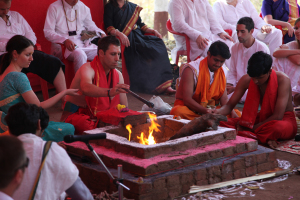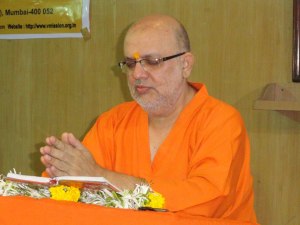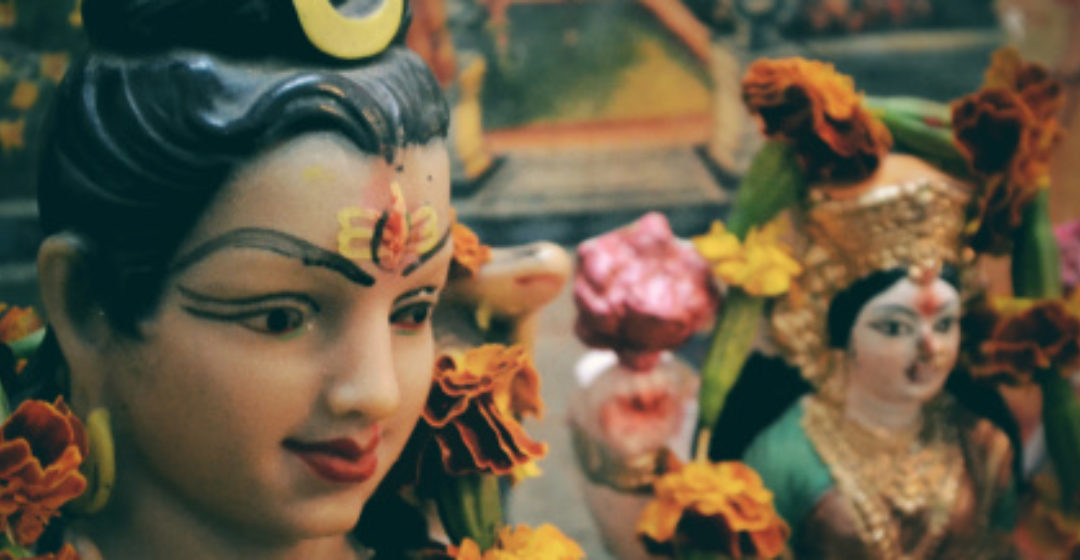Over the years, I have come across many people who find the concept of a polytheist religion like Hinduism, interesting and confusing too. These people are generally curious westerners who want to know more about the land from where Yogashastra comes from.
These people do not have much knowledge about the Hindu religion (as it is being called now). However, it is even more intriguing how some of those who claim to know a lot about it have a completely different understanding of the basic tenets of the Hindu philosophy (but let us leave a discussion about those distortions for another long blog). In a nutshell, here is what I think:
Hinduism is not a religion at all!
And here’s why!
Hinduism is a Geographical Concept

Some theologians like Sadhguru Jaggi Vasudev state that the term Hindu refers to anyone and anything born in the land between the Himalayas and the Hind Sagar (Indian Ocean). The concept of Hindu is a geographical one and not based on religion. The land was probably named after these two significant geographical structures since they are critical in protecting the people of Hind from invasions and outsiders. What it basically implies is that a Muslim or Christian or Jew born in India (also called Hindustan) is a Hindu.
Hinduism is a Recent Idea
Even though the Hindu philosophy is one of the oldest in the world, the concept of it as one religion is relatively recent. The term Hinduism was first used by British writers in early 19th century to describe what the people of this land believed in. It was probably easier for them to refer to the beliefs of all under a single collective umbrella rather than to understand the specific beliefs of the many clans, castes and groups who prayed to as many as 330 million gods.
Hinduism Defies Basic Tenets of a Religion

Hinduism does not have one specific book that details the way in which life should be lived. There is no one place that is considered as the highest authority on the religion. In fact, the philosophy followed by the people in the land of Hind is simple – there is a God in everything. There are gods for elements of nature like Agni (Fire), Vayu (Air), Prithvi (Earth), Varun (Water), Indra (Rain) and more. There is a god of industry (Vishwakarma), god of wealth (Kuber), god of love (Kamadeva) and more. And there are gods for planets and other heavenly bodies too like the sun (Suryadev), moon (Chandradev), and Saturn (Shanidev). There are snake gods, goddesses that protect from specific kinds of ailments (Sitala Mata) and more. The people of this land worship everything in nature. In other words, they see something good in every aspect of life!
Hinduism has no Conversions
While some recent politically motivated people in the country have spoken about converting some castes back to Hinduism, there is no specific process of conversion that has been stated in any of the scriptures. This is why, the philosophy has remained confined to (more or less) the Indian subcontinent.
Hinduism is All-Inclusive
One would consider that a religion would have rules that need to be adhered to. While you will find different groups of people following different practices across the country, there is no one rulebook that binds all Hindu people. While brahmins in the southern states may not consume meat, a Kashmiri brahmin will most certainly do. In fact, if you look at the practices across the various groups, you will find a very practical approach based on the requirements of the times and the lay of the land. It is a pity that most of this understanding has been lost over the years. Which is why some people forget the spirit of the ritual or the reasons why it was suggested and continue to follow it blindly (pity!).
The practice allows for personal interpretations of sin too. There is no higher authority waiting to tally your deeds, categorize them as good and bad and send you to hell or heaven. There is no day of judgement where you shall be punished for your sins or bestowed with blessings and comfort for eternity for your good deeds.
If you kill a terrorist trying to hurt a child, you decide whether you think it is a sin or not. What the court of law decides is another story, but the Hindu philosophy allows you to decide for yourself. In fact, it also states that the consequences (good or bad) of your actions shall be determined automatically.
It accepts all people who follow different practices and rituals. If someone of another religion wants to live life based on the Hindu philosophy, he is considered a practicing Hindu. As mentioned earlier, there is no reason to convert.
The all-inclusive philosophy is well defined in the common phrase – vaasudhaiva kutumbakam (the world is one family).
Hinduism is an Ongoing Discussion

If Hinduism is a collection of spiritual thought over many years, it was probably meant to be an ongoing process. There are no static references and there is an atmosphere of debate and discussion. This was probably intended so that people keep an open mind and change the rituals or moral code based on the requirement of the times.
In chapter 18:63 of the Bhagavad Gita, Lord Krishna says:
iti te jñānam ākhyātaḿ
guhyād guhya-taraḿ mayā
vimṛśyaitad aśeṣeṇa
yathecchasi tathā kuru
(I have given you the most confidential of all knowledge. Analyze it critically and act as per your wish and understanding.)
What is Hinduism Today
India is a land where spiritual thought achieved dizzying heights long before the West. It was a land whose people loved, hated and even fought amongst themselves but never invaded other lands. This, despite being invaded and plundered many times.
While the Hindu people fought off the invaders and retained their sovereignty, a lot of damage was done to the Hindu way of life. Not only did the Muslim invaders plunder riches, they also introduced the concept of a new Abrahamic religion that believed in one God and was relatively less tolerant. The Britishers came later and modified a large part of the history under the pretext of ‘educating heathens’.
By unifying the people of the land of Hind under the umbrella of Hinduism, the British gave rise to a religion that never was! It can probably be considered as the most significant disservice to the beautiful, all-encompassing, and evolving spiritual thought process that Hinduism was.
What is your interpretation of being a Hindu?


foreigners used the term Hindus to all those who are living on the eastern side of river ‘indus’.
India is what lies east of the Indus. In fact the name India is derived from this very river. However, there are many more countries and cultures east of India too 🙂
that is not what books and wikipedia say
I guess there are various versions of what is written, believed and understood. It’s okay to have a different perception about stuff. Does not matter 🙂
true
The term Hinduism is a misnomer as it is not an ‘ism’. Basically it is a sum total of spiritual thought, including practices, that took place in the Indian subcontinent over the past, say three to five thousand years.
Good one !!!
Hinduism is a way of life (the do’s and dont’s) with all our practices having scientific reasons.
Absolutely! While we may not be aware of the scientific reasons behind some practices, it is almost certain that there is one. If we start exploring the body of knowledge behind this, it is amazing how much we don’t know or understand.
Its like comparing oranges and apples. Take any religion and the vast literature they have. The moment we dive into this, one can notice a striking difference, few of which you pointed out. But there are few more I want to very briefly touch upon — (I will stick to the term Hinduism but what I mean is collection of all schools that developed in the land of bharat since ancient times). The language, its etymological and philological keys is profound. The Ṣaḍaṃgās — Nirukta, Jyoutisha, Vyakarana etc, form a coherent 6 keys to unlock the coded wisdom — meaning the codinga nd decoding mechanisms are very refined, The art of yoga, ayruveeda, tantra, etc., are complete subsets equivalent to a whole system of path leading you to realizations. Yet they also counter help each other — very different from present day religious scenario. Mysticism and Esotericism is in very high degree, pertaining to the needs of deepest thinkers of modern times — like Erwin Schrodinger (see his book what is life) or Neils Bohr or Werner Heisenberg — all are founders of Quantum Mechanics.
ALL other relgions are off shoots of ancient cultures — Egyptian or Chaldean or Babylonian etc. But the culture of land of Bharat alone withstood the tides of time and we can see in exoteric sense, its fragments which fused into daily life.
Thank you for your comment. The knowledge that the collection of schools of thought that developed in ancient Bharat is immense. It would be impossible to capture that in a small article trying to give a gist of ‘Hinduism’. In fact, the knowledge seems so vast that it is almost overwhelming at time. Would love to hear some recommendations from you that one could read (in English, please).
Thanks you for your interest and comment again!
Shiwani
Your perception is right on lines of my intuition! Yes, there is always more water than we need in the lake. We drink as much as we need to and let it flow. If you have time and zeal to venture to look through the window of the modern day scholars into the past glory, I would recommend (I will give links, if the authentic downloads are available and if not, I guess you know where to search or buy the books):
1) Sri Aurobindo: One of the modern day Gaigantic personality who experimented on himself, recorded the developments of his physio-psychological progress over 40-50 years.
works can be downloaded at:
http://www.sriaurobindoashram.org/ashram/sriauro/writings.php
——————————————————————————————————————————————–
2) Sir John Woodrooffe/Aurthur Avalon: He is a western man, who got initiated by the Tāntriks of the ancient lore, after which, he changed even his attire and learned earnestly the wisdom and translated and commented and composed few of the finest works in Tāntrik literature — The most famous, if you have heard – The serpent Power.
——————————————————————————————————————————————–
3) Master E.K: (My personal favorite of all): Unfortunately most of his works are in Telugu, but his English compositions can be found at:
https://worldteachertrust.org/en/web/publications/ek-overview-all — (check for nline books) To know his life story,
Audio Lectures delivered in Europe (English): (Choose English from the list)
https://www.youtube.com/channel/UCZc6gUXLSPcI0CvAytlJ3mg/playlists?view=50&shelf_id=4&sort=dd
——————————————————————————————————————————————–
just for inspiration, you can visit: (its a six part video, part 2-5 concentrates on his life and works)
https://www.youtube.com/watch?v=IiUNeMMw58U&list=PLKBSmDe3Xp9eywfSX-0qASnz4_8hQMmPH
——————————————————————————————————————————————–
4) H.P. Blavatsky: She is the a Russian lady, who was chosen to be revealed the wisdom of ancient hierarchy. She established Theosophical Society. Her two works — The secret Doctrine and The Isis Unveiled are magnum opus of the modern day works. But trust me, they are need more than one time reading.
Secret Doctrine: https://www.theosociety.org/pasadena/sd/sd-hp.htm
Isis unveiled: https://www.theosociety.org/pasadena/isis/iu-hp.htm
——————————————————————————————————————————————–
5) Alice .A. Bailey: She has 24 books in her book series. These act as add-ons and supplements and profound extension of Blavatsky’s works.
——————————————————————————————————————————————–
6) Sri Anantacarya (Father of Master E.K): He is one of the rare geniuses who gave an original contribution to the vēdic lore and ayurveda. his two important works can be obtained at:
Vision of aryan Glory: http://ebooks.tirumala.org/Product/?ID=1855
Suparna (an integral outlook of the Vēda): https://archive.org/details/in.ernet.dli.2015.530171
——————————————————————————————————————————————–
Miscellaneous: Works of:
T.V.Kapali Sastry, R.L.Kashyap (http://vedah.com/rlk/), M.P.Pandit, Ramana Maharshi, etc.
——————————————————————————————————————————————–
You can also follow my blog, as from time to time, I try to condense my understanding (taking clues from these books). But I write through my lens, so as you told, by reading the above and many more, you may develop your own perception.
Thanks. Amazing list. I can only hope to go through these …but yes dip we will in the great ocean of knowledge as much as we can 🙂
:)… All the best and have a joyful ride!